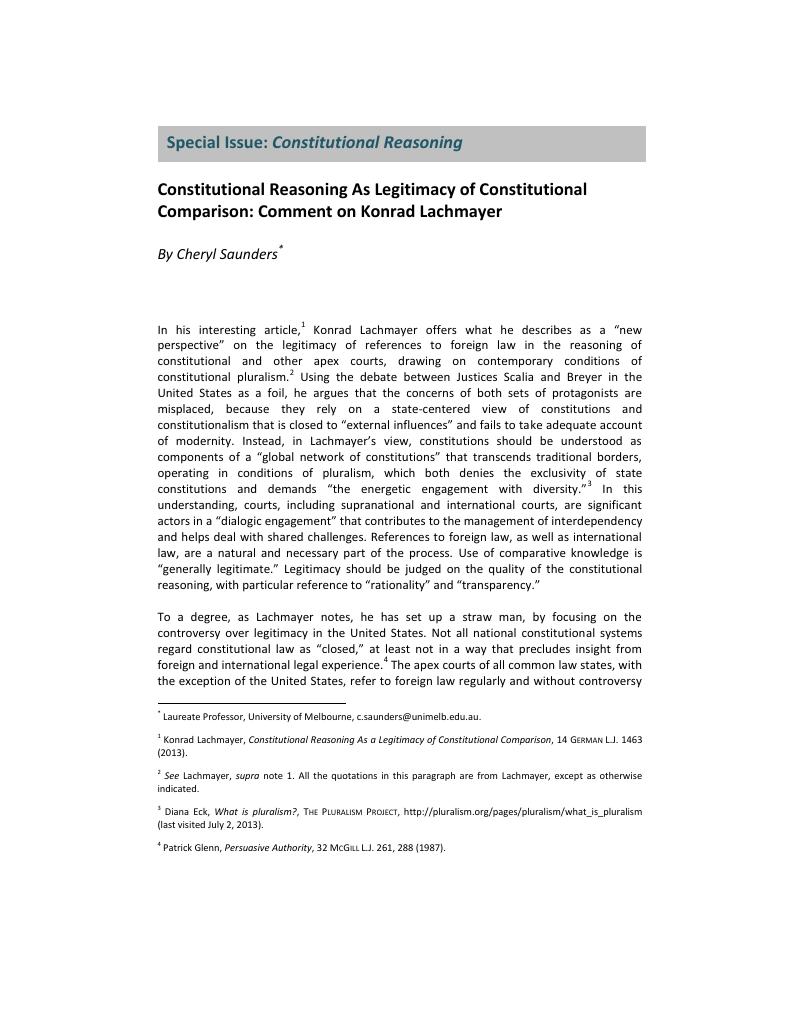Published online by Cambridge University Press: 06 March 2019

1 Lachmayer, Konrad, Constitutional Reasoning As a Legitimacy of Constitutional Comparison, 14 German L.J. 1463 (2013).Google Scholar
2 See Lachmayer, , supra note 1. All the quotations in this paragraph are from Lachmayer, except as otherwise indicated.Google Scholar
3 Diana, Eck, What is pluralism?, The Pluralism Project, http://pluralism.org/pages/pluralism/what_is_pluralism (last visited July 2, 2013).Google Scholar
4 Glenn, Patrick, Persuasive Authority, 32 McGill L.J. 261, 288 (1987).Google Scholar
5 Saunders, Cheryl, Judicial Engagement with Comparative Law, in Comparative Constitutional Law 571 (Tom Ginsburg & Rosalind Dixon eds., 2011).Google Scholar
6 See, for example, the observations of Justice Lee, Jin-Sung on his inauguration as a Justice of the Constitutional Court of Korea on September 20, 2012, Press Release, Constitutional Court of Korea, Justices Kim, Yi-Su, Lee, Jin-Sung, Kim, Chang-Jong, Ahn, Chang-Ho, and Kang, Il-Won Sworn in As New Justices of the Court (Sept. 21 2012), available at http://www.ccourt.go.kr/home/english/welcome/news_view.jsp?seq=151.Google Scholar
I will hold fast to the ideas and spirit of the Constitution and do my best to figure out, referring to the judicial systems of other countries as well as our own Constitution and legal system, a constitutional solution to the conflicts and disputes of our time and to find the right path for the people.
Id.
7 Saunders, Cheryl, The Use and Misuse of Comparative Constitutional Law, 13 Ind. J. Global Legal Stud. 37 (2006).Google Scholar
8 See Glenn, , supra note 4, at 268.Google Scholar
9 Tunisian President Marzouki Proposes International Constitutional Court, Qatar News Agency, Sept. 28, 2012, http://www.qnaol.net/En/Pages/default.aspx?web=/QNAEn/Foreign_News/Politics4/Pages/TunisianPresidentMarzoukiProposesInternationalConstitutionalCourt.aspx. The proposal was made in the General Debate of the 67th session of the General Assembly of the United Nations, on September 28, 2012.Google Scholar
10 Sykes v. Cleary, 1992, 176 CLR 77 (Austl.) (originating from the High Court of Australia).Google Scholar
11 XYZ v. Commonwealth, 2006, 227 CLR 532 (Austl.) (originating from the High Court of Australia).Google Scholar
12 The author correctly points to differences in the German concept of the Rechtsstaat and common law formulations of the rule of law, although formulation of the latter in terms of “independence of the judiciary” is misleading or, at least, incomplete.Google Scholar
13 For an early and influential contribution, see Neil Walker, The Idea of Constitutional Pluralism, 65 Mod. L. Rev. 317 (2002). But compare a recent skeptical analysis by, Martin Loughlin, Professor of Public Law & Head of the Department of Law, London School of Economics, Paper Presented at University College Dublin: Constitutional Pluralism: An Oxymoron? (June 30, 2012).Google Scholar
14 U.N. Secretary General, Guidance Note of the Secretary General: United Nations Assistance to Constitution-making Processes, ¶ 3, 4 (April 2009).Google Scholar
15 Lord Bingham of Cornhill, The Break with the United Kingdom and the Internationalisation of the Common Law, in Centenary Essays for the High Court of Australia 82 (Peter Cane ed., 2004).Google Scholar
16 For the exchange between Justice McHugh, broadly representing the majority, and Justice Kirby, see, Al-Kateb v. Godwin, 2004, 209 CLR 562 (Austl.) (originating from the High Court of Australia).Google Scholar
17 Saunders, Cheryl & Stone, Adrienne, Reference to Foreign Precedents by the Australian High Court: A Matter of Method, in The Use of Foreign Precedents by Constitutional Judges 13 (Tania Groppi & Marie-Claire Ponthoreau eds., 2013).Google Scholar
18 Ackermann, Laurie W. H., Constitutional Comparativism in South Africa: A Response to Sir Basil Markesinis and Jorg Fedtke, 80 Tul. L. Rev. 169, 183 (2005).Google Scholar
19 The warning of Emeritus Justice Kate O'Regan should be borne in mind nonetheless: Courts should avoid “shallow comparativism” but to “forbid any comparative review because of perceived risks associated with [comparative method] would be to deprive our legal system of the benefits of the learning and wisdom to be found in other jurisdictions.” NK v. Minister of Safety and Security 2005 (6) SA 419 (CC) at para. 35 (S. Afr.).Google Scholar
20 Lachmayer, , supra note 1.Google Scholar
21 Lachmayer, , supra note 1.Google Scholar
22 Lachmayer, , supra note 1.Google Scholar